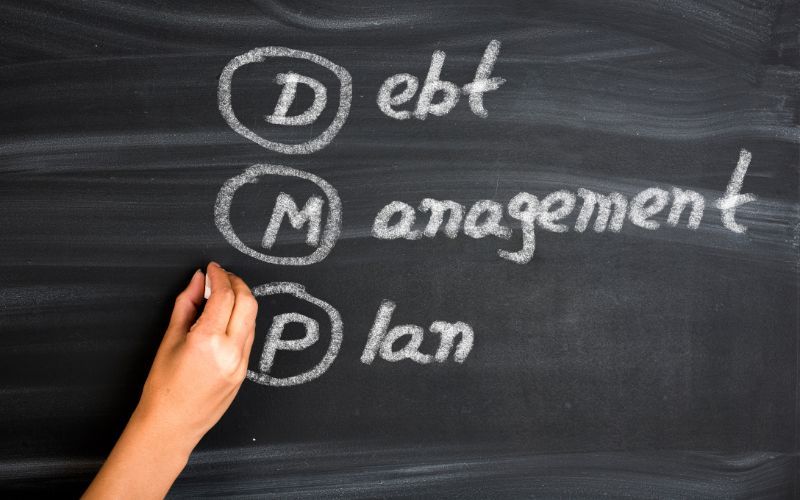Last Updated: March 29, 2024
Discover the pros and cons of a debt management plan
Disclaimer: We are not qualified legal or tax professionals and are not giving advice. Always speak with a qualified professional before making any legal or financial decisions.
Facing the burden of debt can be overwhelming, but a Debt Management Plan (DMP) may offer a pathway to reclaiming your financial freedom. Similar to other debt relief strategies, a DMP consolidates your debts into a single, manageable monthly payment, often with reduced interest rates and waived fees.
This guide will walk you through the essentials of a DMP, from understanding its core principles to implementing it effectively for debt relief. By exploring the nuances of managing your debt through a DMP, you'll gain insights into how this strategy can be tailored to your unique financial situation, potentially saving you from the financial hardship caused by high-interest debt.
With the right approach and professional guidance, a DMP can be a powerful tool in your journey towards a debt-free life.
If you're ready to talk now, skip the article and click here for a free consultation with our debt specialist.
What is a debt management plan?
A debt management plan, often called a debt management program, helps borrowers repay their creditors. It's designed for those who find it hard to meet monthly payments or settle their debts promptly.
Debt management plans often require collaboration with a credit counseling agency. This agency helps draft a budget and repayment plan. They might also negotiate with creditors to reduce interest rates or waive certain fees for the borrower.
The borrower will then make a monthly payment to the credit counseling agency, which will disburse the funds to the creditors according to the plan's terms. A debt management plan aims to help the borrower get out of debt as quickly as possible while reducing the financial strain on the borrower.
Signs You May Need a Debt Management Plan
If you are exhibiting any of the following behaviors or financial situations, it may be time to consider enrolling in a debt management plan:
- You are only able to make the minimum payments on your credit cards and loans. This means you are not making progress in paying down the principal balances.
- You find yourself relying on credit cards to pay for necessities like groceries and utilities because you don't have enough cash.
- Your debt balances are creeping up every month instead of going down.
- You are receiving calls from creditors about late payments.
- Your credit score has taken a hit due to high credit utilization and/or late payments.
- You feel overwhelmed by debt and unable to keep up with monthly payments.
If this sounds familiar, a DMP can help you get back on track financially. The benefits of consolidated payments, reduced interest rates, and working with a credit counseling agency can provide much-needed relief.
The benefits of a debt management plan
A debt management plan (DMP) offers a structured way to manage and reduce your debts. By enrolling, you agree to a consistent monthly payment to your creditors based on your budget. As you'll see, the benefits of a DMP are manifold.
Reduced interest rates
A debt management plan involves negotiating with creditors to lower the interest rates on your credit card debt and other unsecured debts. This can save you a significant amount of money in the long run.
Reduced monthly payments
A credit counseling agency can negotiate to lower interest rates and waive certain fees. This reduces your monthly credit card payments, making debts more manageable and enhancing your cash flow.
One affordable monthly payment
Debt management plans consolidate your debts into a single monthly payment made to a credit counseling agency. They then distribute these funds to your creditors. This centralized approach is often less stressful and more convenient than juggling multiple payments.
Debt repayment timeline
A debt management plan typically involves creating a repayment timeline that outlines how long it will take to pay off your debts. This can help you stay motivated and track your progress as you work to become debt-free.
Avoid bankruptcy
A debt management plan can be an excellent alternative to bankruptcy, as it allows you to repay your debts without bankruptcy. This can help you preserve your credit score and avoid the long-term negative consequences of a BK.
How a debt management plan works
Consider getting a debt management plan if you carry a lot of debt. This is when you work with a company to help you pay off your debt.
The debt management company will work with your creditors to try to get them to lower your monthly payments or interest rates. Then, you will make one payment to the company each month, and they will distribute the money to your creditors. You can watch your credit card debt substantially decrease.
The costs associated with a debt management plan
There are costs associated with a debt management plan, which will vary slightly depending on the credit counseling agency you work with and the plan's terms. Some credit counseling agencies may charge a one-time setup fee, a monthly maintenance fee, or both. These fees can usually range from $25 to $100 per month.
In addition, the credit counseling agency may charge a fee for negotiating with your creditors on your behalf. This fee may be a percentage of your debts or a flat fee.
It's essential to shop around and compare the fees and services of different credit counseling agencies before enrolling in a debt management plan. Nonprofit credit counseling agencies may be a good option, as they charge lower fees or offer their services for free.
A debt management plan aims to help you become debt-free, so it's important to choose an agency that will provide you with the support and guidance you need to succeed.
How do you enroll in a debt management plan?
To enroll in a debt management plan, follow these steps:
Contact a credit counseling agency
You will need to work with a credit counseling agency to create a debt management plan. You can find a reputable agency by contacting the National Foundation for Credit Counseling or searching online for "nonprofit credit counseling."
Review your financial situation
The credit counseling agency will review your financial situation, including your debts, income, and expenses. They will use this information to determine whether a debt management plan is the right option for you.
Create a spending budget
The credit counseling agency will help you create a budget that outlines your income and expenses. This will help you identify areas where you can cut back on spending and free up money to pay off your debts.
Negotiate with creditors
The credit counseling agency may negotiate with your creditors on your behalf to lower the interest rates on your debts or waive specific fees.
Create a repayment plan
he credit counseling agency will work with you to create a repayment plan that outlines how much you will pay each month and how long it will take to pay off your debts.
Make payments
You will make a single monthly payment to the credit counseling agency, which will disburse the funds to your creditors according to the plan's terms.
Monitor your progress
The credit counseling agency will work with you to monitor your progress and make any necessary adjustments to your repayment plan as needed.
Once you have completed these steps, you will be enrolled in a debt management plan. It's important to remember that a debt management plan is a commitment and requires discipline and dedication to succeed. The credit counseling agency will support you and guide you throughout the process.
Questions to Ask Potential Credit Counseling Agencies
Before choosing a credit counseling agency to assist with your debt management plan.
Make sure to ask the following questions:
- What fees do you charge for setting up and maintaining the DMP? Make sure to understand all costs.
- What services are included in the DMP? Look for budgeting help and financial counseling.
- Will you negotiate reduced interest rates with my creditors? This can save a lot on interest.
- Can I contact my counselor outside normal business hours? In case issues come up.
- How often will we review and update my repayment plan if needed? Your situation may change.
- What happens if I miss a monthly payment? Make sure you understand the process.
Asking these questions upfront will ensure you choose the best agency for your needs and understand all aspects of the DMP process. Pacific Debt will be happy to answer any questions you may have.
FAQs
Our Conclusion
Debt management programs are specific programs designed to pay off debts within a certain time frame. It's different from debt consolidation in that it involves working with creditors to lower interest rates and monthly payments rather than taking out a new loan.
If you need help to make minimum payments on high-interest debt, a debt management plan may be right for you. But the decision to enroll shouldn't be taken lightly. Before enrolling in any debt relief program, there are pros and cons to consider.
The best way to decide if a debt management plan is right for you is to talk to a debt relief expert. They'll help you explore all your options and develop a personalized plan that fits your unique financial situation and enables you to eliminate debt.
Get a free consultation today with a certified credit counselor to learn about your options from a professional.
*Disclaimer: Pacific Debt Relief explicitly states that it is not a credit repair organization, and its program does not aim to improve individuals' credit scores. The information provided here is intended solely for educational purposes, aiding consumers in making informed decisions regarding credit and debt matters. The content does not constitute legal or financial advice. Pacific Debt Relief strongly advises individuals to seek the counsel of qualified professionals before undertaking any legal or financial actions.
Reduce Your Credit Card Debt By Up to Half

BBB Reviews | 4.9/5.0 Rating










 Do Not Sell My Personal Information
Do Not Sell My Personal Information